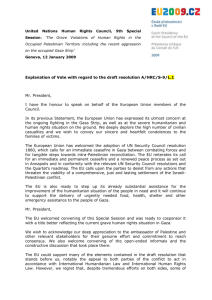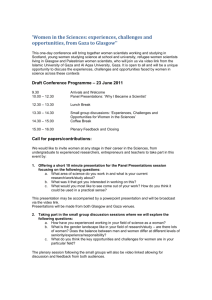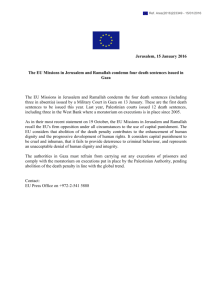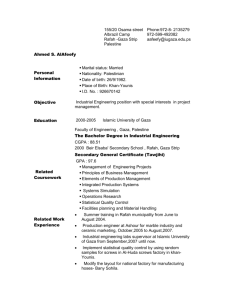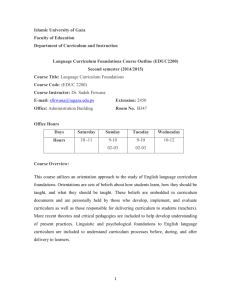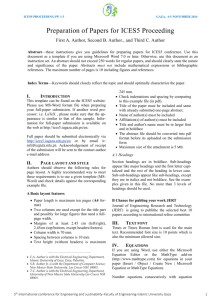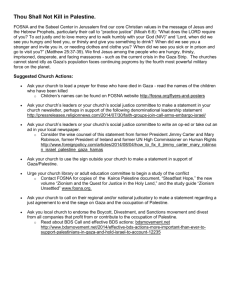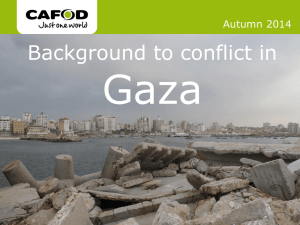Old Nablus Road – Sheikh Jarrah
advertisement
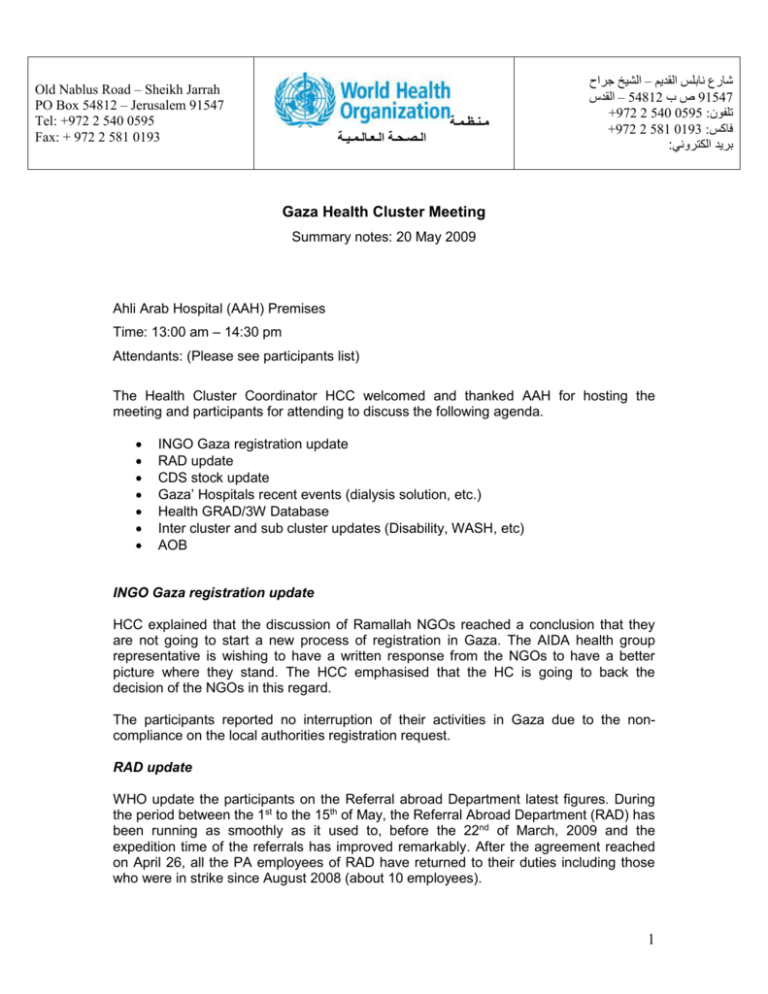
Old Nablus Road – Sheikh Jarrah PO Box 54812 – Jerusalem 91547 Tel: +972 2 540 0595 Fax: + 972 2 581 0193 مـنـظـمـة الـصـحـة الـعـالـمـيـة شارع نابلس القديم – الشيخ جراح – القدس21845 ص ب91547 +575 5 215 5252 :تلفون +575 5 284 5450 :فاكس :بريد الكتروني Gaza Health Cluster Meeting Summary notes: 20 May 2009 Ahli Arab Hospital (AAH) Premises Time: 13:00 am – 14:30 pm Attendants: (Please see participants list) The Health Cluster Coordinator HCC welcomed and thanked AAH for hosting the meeting and participants for attending to discuss the following agenda. INGO Gaza registration update RAD update CDS stock update Gaza’ Hospitals recent events (dialysis solution, etc.) Health GRAD/3W Database Inter cluster and sub cluster updates (Disability, WASH, etc) AOB INGO Gaza registration update HCC explained that the discussion of Ramallah NGOs reached a conclusion that they are not going to start a new process of registration in Gaza. The AIDA health group representative is wishing to have a written response from the NGOs to have a better picture where they stand. The HCC emphasised that the HC is going to back the decision of the NGOs in this regard. The participants reported no interruption of their activities in Gaza due to the noncompliance on the local authorities registration request. RAD update WHO update the participants on the Referral abroad Department latest figures. During the period between the 1st to the 15th of May, the Referral Abroad Department (RAD) has been running as smoothly as it used to, before the 22nd of March, 2009 and the expedition time of the referrals has improved remarkably. After the agreement reached on April 26, all the PA employees of RAD have returned to their duties including those who were in strike since August 2008 (about 10 employees). 1 The process of the patient for accessing the referral medical facility is as follow: 1. The patient gets a referral form signed by the treating physician and the head of the treating department. 2. The patient submits it to the Referral Abroad Department (RAD) to be review and approve by the medical committee that has a regular weekly meeting. 3. Once it is approved by the medical committee, the RAD Director sent the document to MoH Ramallah for approval of the financial coverage and a date for referral from the intended treating medical facility. 4. The patient obtain the approved document and submit them to the District Liaison Office (DLO), responsible for coordinating the crossing of patients via Erez Crossing for WB, East Jerusalem or Jordan and Israel (few cases only). 5. The DLO informs the patient of the result of their application to cross Erez and the date of their permit. 6. If the referral is to Egypt, the patient applies to a similar office run by Hamasappointed team who register the patient to cross Rafah border when it is open. This process was agreed not only by the local authorities but also by the Israeli authorities; shortening the time from several months to a week. Still the RAD does not approve referrals to Israeli Hospitals, except very few cases that cannot be treated in WB or East Jerusalem. From 1 to 15 May 09, the RAD has approved and issued 461 referral documents to various places as follow: 54 to Gaza NGOs, 60 to West Bank, 86 to East Jerusalem, 228 to Egypt, 22 to Jordan and 11 to Israeli hospitals. Cardiology, ophthalmology and oncology medical interventions have been counted for 40 % out of the total referrals during this period. During the same period, the DLO has received 184 applications for permit to cross Erez (101 Males and 83 Females), 104 requests (56.5%) were approved (54M/50F), 2 (1%) denied (1M/1F), 64 (34.7%) under processing (34M/30F), 10 (5.4 %) have been asked to be interviewed by the Israeli General security Services (GSS) before granting their requests (9M/1F), and 4 (2.1 %) have incomplete requests (3M/1F). However, according to the Liaison Officer at Erez, only 125 patients have crossed Erez, including 8 via back to back ambulance service. Rafah border has been closed during this period; however, it was opened for 3 days, from 16 to 18 May for patients, students studying abroad, and residence of other countries. The number of patients who crossed Rafah border to Egypt during this period was 450 patients, and 78 patients returned from Egypt after completing their treatment. CDS stock update OCHA shared the following information: The ministry of health in Gaza warned of imminent depletion of some medical items including child anti epileptic drugs, kidney dialysis drugs and PKU type of infant formula. The statement said that these items are available in the Ramallah drug store and it has not been cleared by MoH in Ramallah to be shipped to Gaza yet. For reference, herein below the link of the statement http://www.moh.gov.ps/newsite/ar/index.php?action=view&page=news&id=317 2 HCC explained that a press conference has been held by the de facto Minister of Health on the disposal of donations of drugs and medical supplies during the Gaza war and the last few months. In the press conference he mentioned that: The total drugs value donated to MoH-Gaza is 8.7 million USD. The total value of donated drugs to be destroyed is 1.9 million USD, representing 22 % of the total drugs donation value. The total value of donated medical supplies is 4.3 million USD. The total value of donated medical supplies to be destroyed is 85,000 USD, representing 2 % of the total medical supplies donated. The MoH received 80 different types of medical equipment covering a wide range of medical specialities with an estimated value of 23 million USD. The main reason the donated drugs and medical supplies are about to be destroyed is: their expiry date, inadequate storage conditions during the waiting time for entry in Gaza, failed the quality control standards or all not part of the essential drugs list. The Minister also mentioned that 180 ambulance cars have been received by MoH and NGOs. (The press release in Arabic is attached) The HCC recommended the participants to inquire if any of their supplies has been discarded and to understand the reasons to be able to reply to their organisations and donors. Participants agreed to form a working group including, WHO, UNICEF, OCHA, PNGO, USAID and led by the HCC to follow the issue of destroying the drugs and medical supplies in terms of process and implications. The latest Gaza CDS zero stock report (May 10) lists 82 items out of stock. This is compared to the 65 items that were out of stock on April 16th. The CDS has received a packing list for the upcoming shipment from Ramallah. Although the list includes 21 items that are currently out of stock in Gaza, some of these items will be delivered in only small quantities. The most critical item that already came from Ramallah is the Hemozol B (for dialysis). Unfortunately, they still don't know the timing of the full shipment. Gaza’ Hospitals recent events In the past two weeks, hospitals in Gaza reported shortage in dialysis solutions, Oncology drugs and fuel. The MoH at Ramallah acted to secure the shortage, and WHO urged the Israeli authorities to allow the entry of the shortage items quickly. 48 pallets have been sent by MoH- Ramallah. The HCC explained that the MoH Ramallah is still coordinating the entry of their items through UNSCO and UNRWA. The fact that the supplies are in Nablus did not help in bringing all the supplies the following day. UNRWA needed one day to arrange for transport from Nablus to Jerusalem and another day to transport the supplies from Jerusalem to Gaza. 3 Health GRAD/3W Database HCC emphasised that OCHA is about to map the activities of various organizations that have placed their activities in the GRAD database, and for those who did not, and will not by Friday 22nd of May 09, they will not be captured by the maps showing the different activities. On the other hand the deadline for the next extraction from GRAD will be 1 June, which will give all sector members plenty of time to input data and also, that we can make sure to have a report we all are feeling giving a correct picture of the situation on the ground. Inter cluster and sub cluster updates WASH Cluster Health promotion group with Surveillance and monitoring group are working on Collecting data on monitoring of seawater to identify the required intervention steps (e.g. awareness campaigns). Collecting data on diarrheal disease as results show an increase in the incidence of the disease in 2009 as compared to 2008 mainly in Khan Younis and North Gaza Collecting the results of tests carried out on water samples. Results showed that contamination is mainly in water samples collected from water storage tanks and private wells. Disability Sub-cluster update(DSC) Handicap International, the lead of the sub-cluster is meeting with other organizations and sub-clusters (Child Protection, etc.) for mainstreaming activities. Also, will attempt to contact all service providers who provide assistive devices (about 50), to prevent duplication of providing the service, to set regulations for the practice and specifications of the provided equipment. A plea was made to all the organisations that provide assistive devices to share this information to avoid duplications and waste of resources. Organisations were requested to contact Adele Perry (email as per attendance list). AOB UNFPA has called upon various agencies to provide information (content, types and quantities if possible) on whatever hygiene items donations they've distributed during and aftermath the latest crisis. In its effort to avoid duplication and identify gaps and needs for future distribution. Influenza A The HCC informed the participants of the proper term to refer to the Swine Flu is influenza A. As of19 May 2009, 40 countries have officially reported 9830 cases of influenza A (H1N1) infection, including 79 deaths. 4 MoH at Ramallah and Gaza have produced leaflets, brochures and posters on influenza in Arabic language, and they are in the process of distributing them to the health facilities and other concerned organizations. HCC informed the participants that there are 2300 doses of Tamiflu available in Gaza now, and the MoH plan is to secure 125,000 doses. The next Gaza Health Cluster meeting will be held on June 3, 2009 at PNGO. Attendance List: 1. Rania Sammour, Save the Children, rsammour@savethechildren.org 2. Reham Owda, MDM Spain, palestina@medicosdelmundo.org 3. Ali A Shatali, PPC, ashatali3@hotmail.com 4. Rami Hamarna, Flagship Project rhamarna@flagshipproject.org 5. Paivi Muma, ACT International, p_hieta@yahoo.com 6. Mohamed Ramadan, ICRC, gaza.gaz@icrc.org 7. Marianne Whittington, ICRC, gaza.gaz@icrc.org 8. Mohammed Al Jaro, Welfare Association aljarom@jwelfare.org 9. Rafat Hassouna, UNICEF rhassouna@unicef.org 10. Adele Perry, Handicap International, ta.hi.pal@gmail.com 11. Sarah Hunt, HelpAge International, shunt@helpage.org 12. Mais Ghooty, MERLIN admin.gaza@merlin-opt.com 13. Adel Kaddum, Islamic Relief- France sifpalestine@yahoo.com 14. Heba Hamarna, MDM-France mdmg2@palnet.com 15. Osama Abueita, UNFPA Abueita@unfpa.org 16. Faisa Al Sharif UNRWA f.el-sharif@unrwa.org 17. Azzam H Al Sagga, Christian Aid, Azzam_sk@hotmail.com 18. Amjad Shawa, PNGO, pngo@palnet.com 19. AbdelNaser Soboh, WHO, aso@who-health.org 20. Dr. Jorge Martinez, Health Cluster Coordinator jma@who-health.org 21. Sami Abu Sultan, Austrian R O, sami.abusultan@ada.gv.at 22. Haroun Bessiso, PFBS, harounbess@hotmail.com 23. Fikr Shalltoot, MAP-UK, fikr@map-uk.org 24. Reem Abu Shomar, WASH focal person rabushomar@yahoo.com 25. Hamada Al Bayari, OCHA al-bayari@un.org 26. Fyrial Snounu, USAID fsnounu@usaid.gov 27. Elise Peron, MDM-France mdmg@palnet.com 28. Rami Mahani, Islamic Relief epm@irpal.org.ps 29. Suhaila Tarazi, Ahli Arab Hospital Suhaila@palnet.com 5
